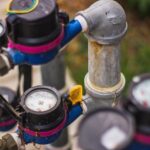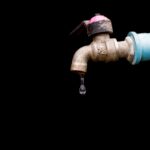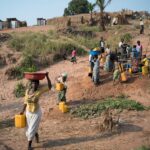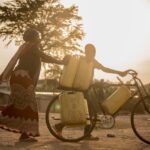The Rural Woman and Her Children – The Burden of Fetching Clean Water in Nigeria
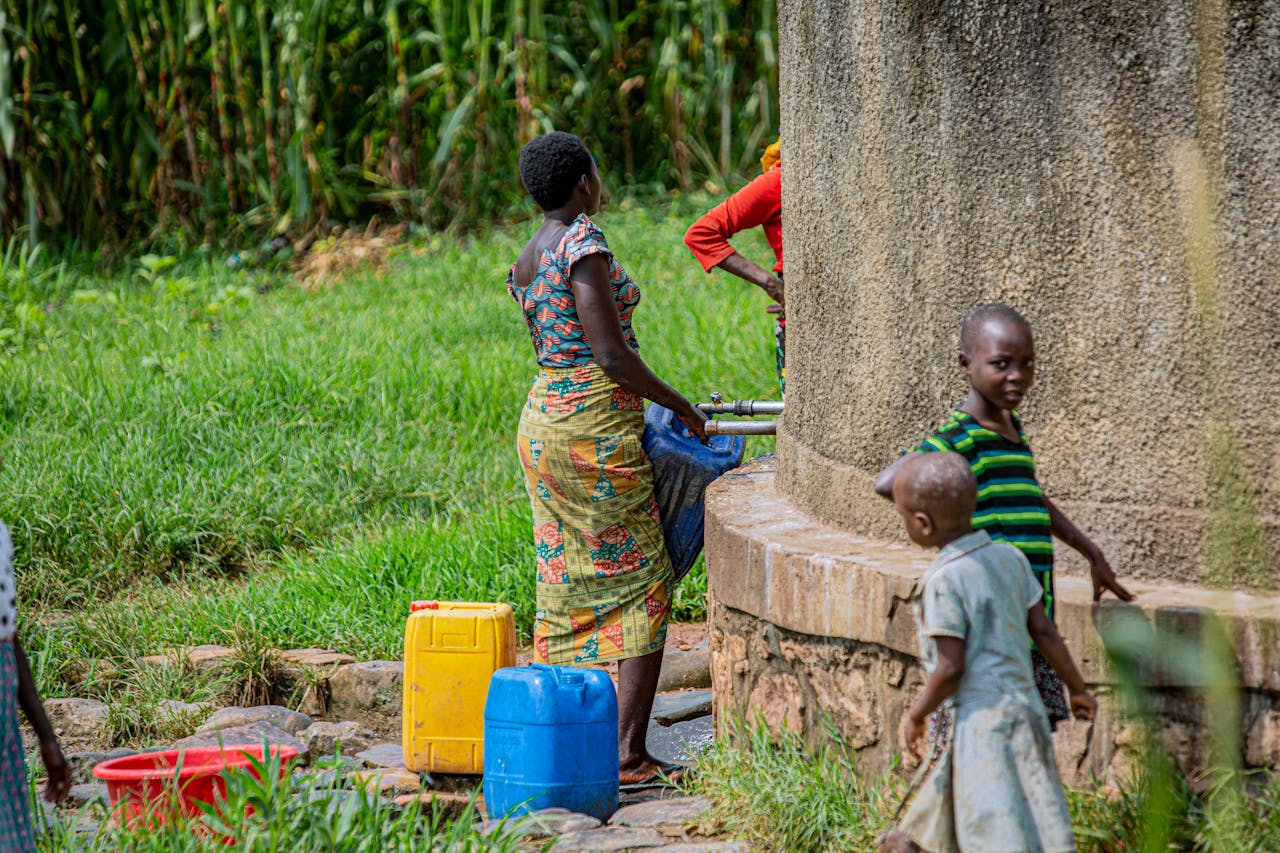
In the heart of rural Nigeria, a silent battle unfolds every day. It’s not fought with weapons, but with large bowls, buckets and jerry cans. The warriors? Women and children, shouldering the immense burden of fetching clean water for their families.
While city dwellers might take a turn of the tap for granted, in many rural areas, access to clean water is a daily struggle. And it’s a struggle that falls disproportionately on the shoulders of women and their children.
This isn’t just about convenience. It’s about health, education, safety, and the very fabric of rural communities. As we delve into this issue, we’ll see how something as simple as water access can shape the entire life of a rural family.
Dawn to Dusk
Let’s consider a story that depicts a day in the life of a regular rural woman.
It’s barely dawn but Fati is already awake. At 28, she’s a mother of four, and her day revolves around water.
Her first trip to the stream starts before sunrise. It’s a 2-kilometre walk each way, balancing a 20-litre container on her head. By the time she returns, her older children are awake and preparing for school. The water she brought isn’t enough for the family’s needs, so there’s really no time to rest.
Throughout the day, Fati will make this trip three or four times. Between these water runs, she tends to her small farm, prepares meals, and cares for her youngest child. As evening falls, she makes one last trip to ensure there’s enough water for the night and early morning.
Now this isn’t just Fati’s story. It’s the reality for millions of rural women across Nigeria.
The Long Walk
The distance to the nearest water source varies, but it’s rarely close.
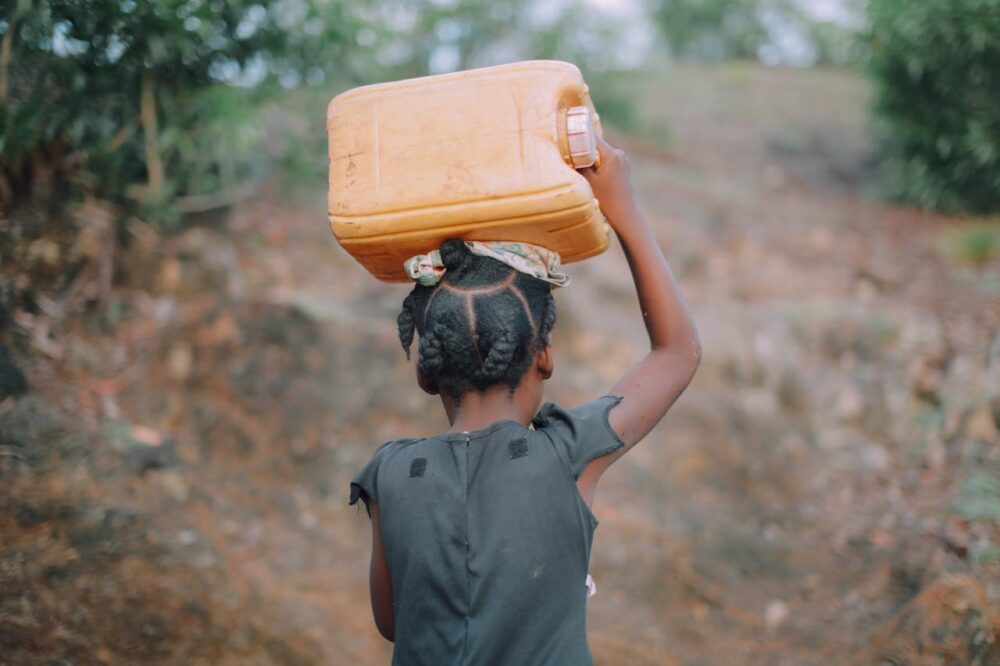 According to USAID, on average, women and girls in developing countries walk 6 kilometres a day. For the Nigerian rural woman, that’s like walking from the National Stadium in Abuja to the city centre – and back, every single day.
According to USAID, on average, women and girls in developing countries walk 6 kilometres a day. For the Nigerian rural woman, that’s like walking from the National Stadium in Abuja to the city centre – and back, every single day.
It’s not just the distance that’s challenging. These women are carrying up to 20 litres of water on their heads. That’s 20 kilograms which is like carrying a five-year-old child on your head for kilometres.
The paths are often uneven, crossing streams or climbing hills. During rainy seasons, they become muddy and dangerous. In dry seasons, the harsh sun makes the journey even more exhausting.
Health Implications
The health impacts of this daily burden are severe and far-reaching.
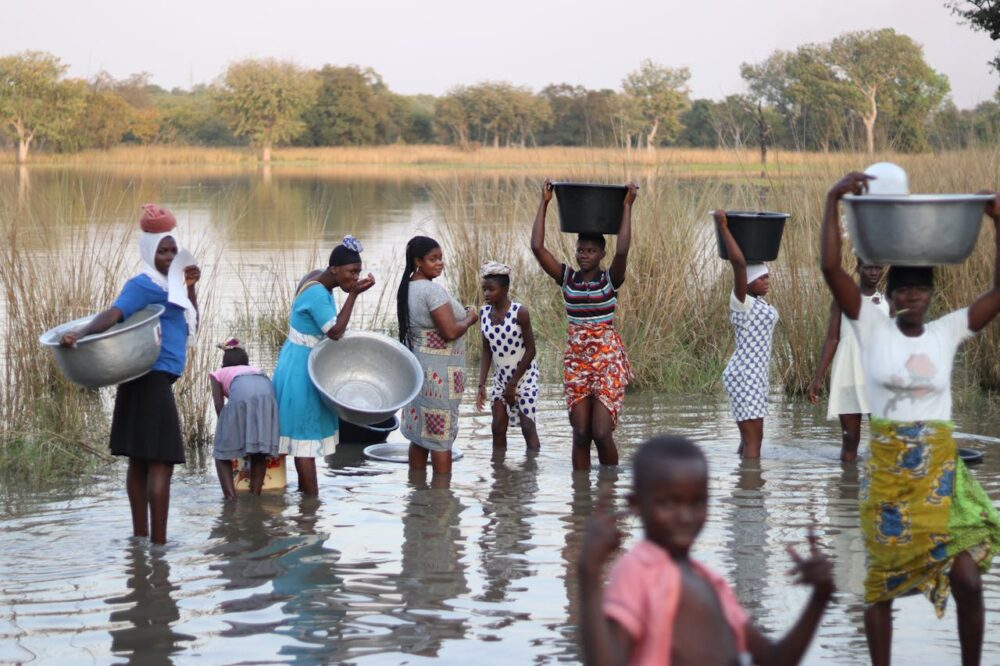 First, there’s the water itself which is often fetched from streams or drawn from shallow wells. This water is frequently contaminated and it leads to waterborne diseases like cholera, typhoid, and diarrhoea. In rural Nigeria, these illnesses are not just common, they are a leading cause of death, especially among children.
First, there’s the water itself which is often fetched from streams or drawn from shallow wells. This water is frequently contaminated and it leads to waterborne diseases like cholera, typhoid, and diarrhoea. In rural Nigeria, these illnesses are not just common, they are a leading cause of death, especially among children.
Then there’s the physical toll of fetching water. The strain of carrying heavy loads leads to chronic back and neck pain. Many women develop problems with their spine over time. Pregnant women who continue this task risk complications.
The time spent fetching water also means less time for personal hygiene.
Education On Hold
For many rural children, especially girls, education takes a backseat for the need to fetch water.
Young girls often miss school to help their mothers fetch water. Even when they do attend, the early morning water runs leaves them tired and struggling to concentrate.
According to UNICEF, Time spent fetching water keeps girls out of school in Nigeria. Fetching water before school doesn’t mean they won’t still fetch water after school. So there’s the part where they struggle to concentrate in the mornings and also the part where there’s barely time to attend to their homework or even read.
It’s a vicious cycle where the girls miss school to fetch water, falling behind in their studies which then leads to higher dropout rates, continuing the cycle of poverty and gender inequality.
Economic Consequences
The hours spent fetching water are hours not spent on income-generating activities.
Many women in rural Nigeria engage in small-scale farming or trading to support their families. But the time “wasted” by water fetching limits their productive capacity. A woman spending 3-4 hours a day on fetching water might be losing out on 20-25 hours of potential work each week.
This doesn’t just affect individual families. It impacts entire communities. The World Bank estimates that Nigeria loses about 1.3% of its GDP annually due to poor sanitation which is of course as a result of poor water access. A significant portion of this comes from lost productive hours in rural areas.
Moreover, the constant struggle for water keeps families trapped in a cycle of poverty. The time and energy spent on this basic need leaves little room for education, skill development, or entrepreneurship that could lift families out of poverty.
In essence, the lack of accessible clean water isn’t just an inconvenience, it’s a major barrier to economic development in rural Nigeria.
Safety Concerns
The journey to fetch water is more than tiring, it can be dangerous. Women and children often walk alone on isolated paths, making them vulnerable to attacks from both humans and animals.
In some areas, there are reports of assaults on women and girls during their water-fetching trips. The risk increases during early morning or late evening hours when visibility is low.
Wildlife poses another threat. Depending on the region, encounters with snakes or other dangerous animals are not uncommon. During dry seasons, when water sources are more scarce, there’s also the risk of confrontations with fights breaking out at crowded water points.
Cultural and Social Aspects
In many rural Nigerian communities, water collection is seen as a woman’s job. This perception is deeply rooted in traditional gender roles.
At water fetching points, be it streams, wells, or communal taps, women and girls often gather, turning the chore into a social activity. They share news, offer support, and build community bonds. While this can be positive, it also reinforces the idea that water fetching is a female responsibility.
Men’s involvement in water fetching is often limited. 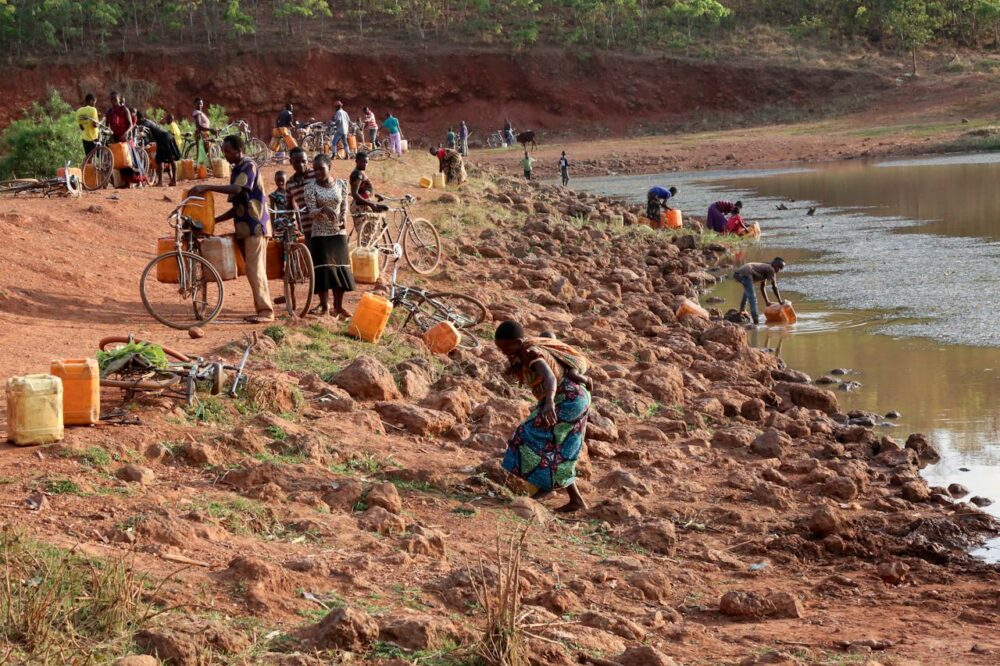 When men do help, it’s usually by using bicycles or motorcycles to transport water, a method not available to most women due to cultural norms or lack of resources.
When men do help, it’s usually by using bicycles or motorcycles to transport water, a method not available to most women due to cultural norms or lack of resources.
Coping Strategies
Rural families have developed various strategies to manage their limited water resources. Many households practise strict water rationing, prioritising drinking and cooking over cleaning and hygiene.
Some communities have developed informal water-sharing systems. Families with access to private wells might share with neighbours, creating a network of reciprocity.
In some areas, people have started harvesting rainwater during the wet season. While this helps, it’s often not enough to last through the dry months.
Government Initiatives and Shortcomings
The Nigerian government has launched several initiatives to improve rural water access. The National Water Resources Policy aims to ensure sustainable access to safe water for all Nigerians.
However, implementation often falls short. Many rural areas still lack basic water infrastructure. Boreholes and wells, when installed, frequently fall into disrepair due to lack of maintenance.
The gap between urban and rural water access remains wide. While urban areas see improvements, rural communities often feel left behind in water development projects.
NGO Interventions
Non governmental organisations are working to fill the gaps left by government efforts. These NGOs often take a community-centred approach, involving local people in the planning and maintenance of water projects.
From installing solar-powered boreholes in rural communities, significantly reducing the distance women and children need to travel for water, to also providing training on borehole maintenance, ensuring the sustainability of these projects. These NGOs do a lot.
Some focus mainly on education, teaching communities about water conservation and hygiene practices. These efforts, while not solving the infrastructure problem, help communities make better use of available water resources.
Technological Solutions
Simple technologies can make a big difference in rural water access. Portable water filters, for instance, can make water from streams safer to drink.
Pedal-powered water pumps are another innovation gaining traction. These allow for easier water transport without the need for electricity or fuel.
However, introducing new technologies comes with challenges. There’s often a need for community education and ongoing technical support to ensure these solutions are used effectively and maintained properly.
The Ripple Effect of Clean Water Access
When rural communities gain easy access to clean water, the changes are profound. Women and girls suddenly have hours freed up each day. This time can be used for education, income-generating activities, or simply rest.
Health improvements are often immediate. Rates of waterborne diseases drop, and children miss fewer school days due to illness.
The economic impact is significant too. With more time for productive activities, family incomes often increase. This can lead to better nutrition, improved housing, and more children attending school.
Be Part of the Solution
Solving Nigeria’s rural water crisis requires effort from everyone. Here’s how you can help:
- Raise awareness: Share information about this issue with your network.
- Support organizations like Aqua Maya: Donations, no matter how small, can make a big difference.
- Advocate for better policies: Engage with your local and national representatives about rural water access.
- Volunteer: Many NGOs need volunteers for their water projects.
- Conserve water: By using water responsibly, you’re setting an example and preserving this precious resource.
Don’t belittle the role you play, every action counts. By working together, we can lighten the burden for rural women and children.
Conclusion
The story of water in rural Nigeria is, at its core, a story of women and children. It’s a tale of resilience, of daily struggles, and of potential unfulfilled. But it doesn’t have to remain this way.
The burden of fetching water shapes every aspect of rural life – from health and education to economic opportunities and social dynamics. It’s a burden that weighs heaviest on women and girls, perpetuating cycles of poverty and gender inequality.
Yet, within this challenge lies an opportunity for transformative change. Providing accessible clean water to rural communities isn’t just about convenience; it’s about unlocking human potential. It’s about giving girls the chance to attend school regularly, women the time to engage in income-generating activities, and families the foundation for better health and hygiene.
The path forward requires a multi-faceted approach:
- Infrastructure development: Investing in sustainable water systems that reach the most remote areas.
- Community engagement: Involving local people, especially women, in the planning and maintenance of water projects.
- Education: Promoting water conservation and hygiene practices to maximize the impact of improved water access.
- Policy implementation: Ensuring that government initiatives translate into real changes on the ground.
- Technological innovation: Embracing simple, effective solutions that can be maintained locally.
- Continued support: Recognizing that solving this crisis is an ongoing process, not a one-time fix.
We at Aqua Maya are contributing our own quota and it is only wise to admit that we cannot do it alone. Every Nigerian, whether urban or rural, has a stake in this issue. By supporting these efforts, raising awareness, and demanding action from our leaders, we can all contribute to a future where clean water is a reality for every family without disparity.
The women and children of rural Nigeria have carried this burden for too long. It’s time we all share the load. Because when we lighten their burden, we uplift entire communities, and ultimately, our entire nation.
As we move forward, let’s envision a Nigeria where no child misses school to fetch water, where no woman spends her days carrying heavy jerrycans, and where clean water flows freely in every village. This vision is within our reach. Together, we can turn it into reality.
Sources:
- https://www.usaid.gov/six-kilometers-day
- Geere JA, Hunter PR, Jagals P. Domestic water carrying and its implications for health: a review and mixed methods pilot study in Limpopo Province, South Africa. Environ Health. 2010 Aug 26;9:52. doi: 10.1186/1476-069X-9-52. PMID: 20796292; PMCID: PMC2939590. https://pmc.ncbi.nlm.nih.gov/articles/PMC2939590/
- https://www.unicef.org/nigeria/water-sanitation-and-hygiene
- Adamu I, Andrade FCD, Singleton CR. Availability of Drinking Water Source and the Prevalence of Diarrhea among Nigerian Households. Am J Trop Med Hyg. 2022 Sep 6;107(4):893-897. doi: 10.4269/ajtmh.21-0901. PMID: 36067986; PMCID: PMC9651543. https://pmc.ncbi.nlm.nih.gov/articles/PMC9651543/
- https://www.unicefusa.org/stories/time-spent-fetching-water-keeps-girls-out-school-nigeria
- https://www.unicef.org/press-releases/unicef-collecting-water-often-colossal-waste-time-women-and-girls
- Maina,Sylvia Wakiuru; Sittoni,Toni. Nigeria loses NGN455 billion annually due to poor sanitation (English). Economic impacts of poor sanitation in Africa,Water and sanitation program Washington, D.C. : World Bank Group. http://documents.worldbank.org/curated/en/855961468297356898/Nigeria-loses-NGN455-billion-annually-due-to-poor-sanitation
- https://www.unicef.org/nigeria/media/1491/file/Nigeria-making-Nigeria-open-defecation-free-by-2025.pdf.pdf
- https://pmc.ncbi.nlm.nih.gov/articles/PMC7592242/#R4
- https://www.sciencedirect.com/science/article/abs/pii/S2211464512001406
- https://iwaponline.com/wp/article-abstract/20/3/597/38710/Rural-water-supply-in-Nigeria-policy-gaps-and?redirectedFrom=fulltext



